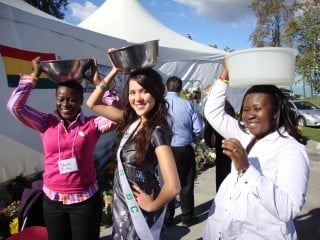Rich or Blind – a Perspective on Giving.
We should extend the ideas of James 5:2-3 beyond the mere accumulation of money and look at our penchant for gaining social position, and maintaining control. My daughter sent me this article to shake me out of my complacency: “Volunteerism: More Harm Than Good,” by Heather Ruiz. It is worth reading because the issues she talks about may be of more concern to us than monetary wealth.

Human rights activist Tara Teng
Heather Ruiz’s article reminded me that sharing wealth often has another agenda. Sometimes the agenda is hidden behind youthful idealism and ignorance. That is understandable and there is always room for us to grow and develop. When we have given money or time to helping those we perceive of as needy we feel we have paid our social debt while we remain cocooned in our smug satisfaction that we are better than “them”.
I was particularly challenged by a couple of statements. In her reported conversation with Cheikh Mohammad, a village chief, he says:
“Heather, a donation is a very dangerous thing to give away. Your American world is filled with so many items and material goods, that you might not understand the gravity of handing something for free to someone who has never been handed anything.”
I have seen too many occasions where donations have been made without serious consideration of the consequences to the recipient. Here are two examples I am familiar with:
There was an effort in our area of the world to gather up old computers when schools replaced them with newer computers and send them to mission schools so that students would have the experience of working with computers. Unfortunately, five-year-old computers are a liability. They are not reliable and parts are difficult to obtain. Furthermore there are few people in the mission schools with the technical skills or the time to troubleshoot and repair old computers. They quickly fell into disrepair and just wasted space.
I once had to prepare a PowerPoint presentation for someone who had volunteered their time and money to a project for the needy. The photographs in the presentation were a set of “selfies” – pictures of the volunteer with smiling children, standing in front of a church that he had painted, in a clinic with sick children. The presentation left me wondering whether the children had benefited, or had it just been the display of social capital hoarded by the volunteer.
Helping people in other cultures requires understanding them. And that means spending time with them. We often fall into the trap of accepting stereotypes of other cultures that reinforce our perception of being superior rather than genuinely helping them.
Cheikh Mohammad continues:
“Do you know what this village means? Generations of desert wanderers, learning and toiling for their bread and meat and homes. We are proud of this; we are empowered, by this. Now, give a village man a handout? You’ve just weakened him. You’ve increased his dependency; diminished his sense of self-esteem. One of the most widely-accepted notions is that Westerners are the solution to African problems. This requires portraying us as helpless and endlessly recirculating images only of abandonment and violence, or innocence and primitivism.”
Of course in the event of natural catastrophe and war, there is often a genuine need for donated resources. Food, water, sanitation, shelter and security must be delivered quickly, but when it comes to helping the “poor” much more thought and considerably more commitment is required than giving donations from our wealth.
Here are three points to consider:
- How well do we know those to whom we feel the need to give our money or time? Are we willing to invest ourselves by developing relationships and friendships?
- How do we eliminate the element of “social superiority from our donations?
- Genuine donation means empowering the needy to do things themselves rather than doing things for them. That is much harder than donating money or volunteering time.
The message to the church of Laodicea accuses us of believing we are rich and in need of nothing. We are invited to use eye-salve to see our real condition.
